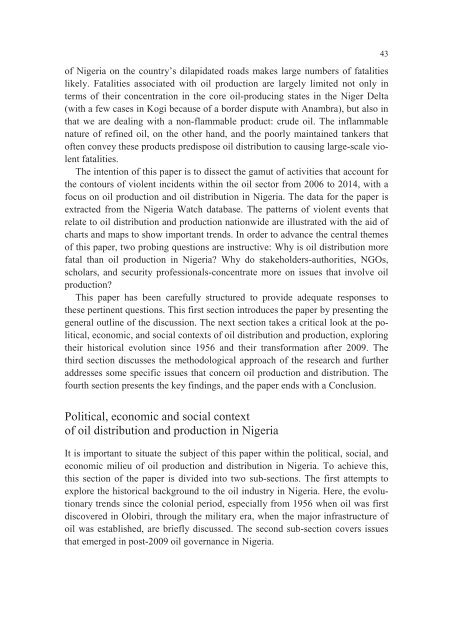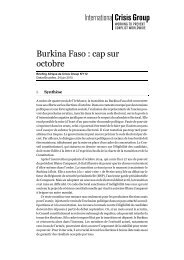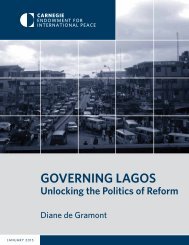Violence in Nigeria
ASC-075287668-3743-01
ASC-075287668-3743-01
You also want an ePaper? Increase the reach of your titles
YUMPU automatically turns print PDFs into web optimized ePapers that Google loves.
of <strong>Nigeria</strong> on the country’s dilapidated roads makes large numbers of fatalities<br />
likely. Fatalities associated with oil production are largely limited not only <strong>in</strong><br />
terms of their concentration <strong>in</strong> the core oil-produc<strong>in</strong>g states <strong>in</strong> the Niger Delta<br />
(with a few cases <strong>in</strong> Kogi because of a border dispute with Anambra), but also <strong>in</strong><br />
that we are deal<strong>in</strong>g with a non-flammable product: crude oil. The <strong>in</strong>flammable<br />
nature of ref<strong>in</strong>ed oil, on the other hand, and the poorly ma<strong>in</strong>ta<strong>in</strong>ed tankers that<br />
often convey these products predispose oil distribution to caus<strong>in</strong>g large-scale violent<br />
fatalities.<br />
The <strong>in</strong>tention of this paper is to dissect the gamut of activities that account for<br />
the contours of violent <strong>in</strong>cidents with<strong>in</strong> the oil sector from 2006 to 2014, with a<br />
focus on oil production and oil distribution <strong>in</strong> <strong>Nigeria</strong>. The data for the paper is<br />
extracted from the <strong>Nigeria</strong> Watch database. The patterns of violent events that<br />
relate to oil distribution and production nationwide are illustrated with the aid of<br />
charts and maps to show important trends. In order to advance the central themes<br />
of this paper, two prob<strong>in</strong>g questions are <strong>in</strong>structive: Why is oil distribution more<br />
fatal than oil production <strong>in</strong> <strong>Nigeria</strong>? Why do stakeholders-authorities, NGOs,<br />
scholars, and security professionals-concentrate more on issues that <strong>in</strong>volve oil<br />
production?<br />
This paper has been carefully structured to provide adequate responses to<br />
these pert<strong>in</strong>ent questions. This first section <strong>in</strong>troduces the paper by present<strong>in</strong>g the<br />
general outl<strong>in</strong>e of the discussion. The next section takes a critical look at the political,<br />
economic, and social contexts of oil distribution and production, explor<strong>in</strong>g<br />
their historical evolution s<strong>in</strong>ce 1956 and their transformation after 2009. The<br />
third section discusses the methodological approach of the research and further<br />
addresses some specific issues that concern oil production and distribution. The<br />
fourth section presents the key f<strong>in</strong>d<strong>in</strong>gs, and the paper ends with a Conclusion.<br />
43<br />
Political, economic and social context<br />
of oil distribution and production <strong>in</strong> <strong>Nigeria</strong><br />
It is important to situate the subject of this paper with<strong>in</strong> the political, social, and<br />
economic milieu of oil production and distribution <strong>in</strong> <strong>Nigeria</strong>. To achieve this,<br />
this section of the paper is divided <strong>in</strong>to two sub-sections. The first attempts to<br />
explore the historical background to the oil <strong>in</strong>dustry <strong>in</strong> <strong>Nigeria</strong>. Here, the evolutionary<br />
trends s<strong>in</strong>ce the colonial period, especially from 1956 when oil was first<br />
discovered <strong>in</strong> Olobiri, through the military era, when the major <strong>in</strong>frastructure of<br />
oil was established, are briefly discussed. The second sub-section covers issues<br />
that emerged <strong>in</strong> post-2009 oil governance <strong>in</strong> <strong>Nigeria</strong>.






